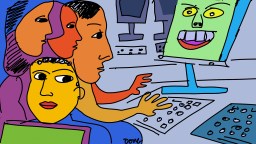internet
Crowdsourcing as an idea isn’t anything new, says historian and sex researcher Alice Dreger. She tells us about the history of public gathering of information from the medieval era to today.
▸
4 min
—
with
Why do you check your phone 150 times a day? Is it a conscious choice, or have the attention merchants gotten into your head?
▸
5 min
—
with
Outraged by something on the internet? Yawn. You may be simply falling for a very old trick… and becoming a run-of-the-mill bully in the process.
▸
5 min
—
with
The Internet is all shadows and mirrors—but what if it were the central source of truth? Thanks to Blockchain technology, it’s a future that’s possible.
▸
5 min
—
with
As the Internet takes over from broadcast television, we find ourselves in a new psychological ecosystem—and people’s ability or failure to adapt explains the last two years of American politics.
▸
9 min
—
with
A classic law of Internet debate explains why bringing up Hitler is a terrible idea as White House Press Secretary Sean Spicer found out in a disastrous press conference.
“Shut up and take my money” isn’t just a meme anymore, it’s the way people are increasingly choosing to access art, news, and culture.
If Indiana Jones and Google Earth had a love child, it would be GlobalXplorer, a “space archaeology” software by TED Prize winner Sarah Parcak.
Did decentralizing top-down media control bring us any closer to the truth-topia we were hoping for?
▸
6 min
—
with
Is the technology of the future more radical than the technology of the past? Alison Gopnik provides some historical perspective.
▸
5 min
—
with
A new site offers a way to delete most of your Internet accounts in one go.
The average person checks their phone 200 times a day. It borders on addiction for some, but according to cyberpsychologist Mary Aiken there are easy ways to unlearn this compulsion.
▸
3 min
—
with











